formerly eScholarship Editions


|
|
|
|
Your request for similar items found 20 book(s). | Modify Search | Displaying 1 - 20 of 20 book(s) | |
| 1. | 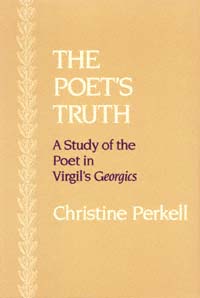 | Title: The poet's truth: a study of the poet in Virgil's Georgics Author: Perkell, Christine Published: University of California Press, 1989 Subjects: Classics | Classical Literature and Language Publisher's Description: The controversy over Virgil's optimism or pessimism, which has long absorbed readers of his poetry, might fruitfully yield to a perspective which allows contradictions to stand unresolved, to constitute, in fact, the essence of his poems' meaning. So interpreted, the pervasive contradictions of the Georgics are not problems to be solved, but expressions of the poet's vision of fundamental tensions in human experience.Focusing on the figure of the poet in his relationship to the farmer, Professor Perkell studies oppositions between power and beauty, profit and art, matter and spirit, which are critical to the poem's meaning. She points to the poet's privileging of myth over praeceptum , of divine revelation over experiment and practice, and of mystery over solution. The poem's oppositions find ultimate expression in the bougonia , literally false as Georgic precept but metaphorically true as image of Iron Age technology and culture. Through this metaphor, the poet suggests the high value of his own truth and implicitly challenges the values of the agricultural, material poem which the Georgics on its surface professes to be.Shaped by insights of reader-response and structuralist criticism, this new study of the Georgics should interest Classicists and students of literature. [brief] Similar Items |
| 2. | 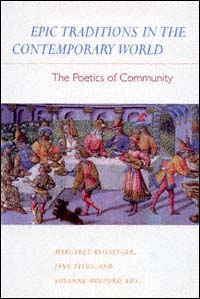 | Title: Epic traditions in the contemporary world: the poetics of community Author: Beissinger, Margaret H Published: University of California Press, 1999 Subjects: Literature | Classics | Classical Literature and Language | Comparative Literature Publisher's Description: The epic tradition has been part of many different cultures throughout human history. This noteworthy collection of essays provides a comparative reassessment of epic and its role in the ancient, medieval, and modern worlds, as it explores the variety of contemporary approaches to the epic genre. Employing theoretical perspectives drawn from anthropology, literary studies, and gender studies, the authors examine familiar and less well known oral and literary traditions - ancient Greek and Latin, Arabic, South Slavic, Indian, Native American, Italian, English, and Caribbean - demonstrating the continuing vitality of the epic tradition.Juxtaposing work on the traditional canon of western epics with scholarship on contemporary epics from various parts of the world, these essays cross the divide between oral and literary forms that has long marked the approach to the genre. With its focus on the links among narrative, politics, and performance, the collection creates a new dialogue illustrating the sociopolitical significance of the epic tradition. Taken together, the essays raise compelling new issues for the study of epic, as they examine concerns such as national identity, gender, pedagogy, and the creation of the canon. [brief] Similar Items |
| 3. | 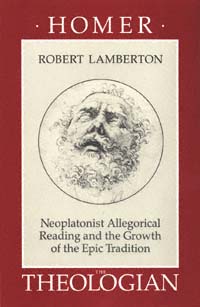 | Title: Homer the theologian: Neoplatonist allegorical reading and the growth of the epic tradition Author: Lamberton, Robert Published: University of California Press, 1989 Subjects: Classics | Classical Literature and Language | Literary Theory and Criticism Publisher's Description: Here is the first survey of the surviving evidence for the growth, development, and influence of the Neoplatonist allegorical reading of the Iliad and Odyssey. Professor Lamberton argues that this tradition of reading was to create new demands on subsequent epic and thereby alter permanently the nature of European epic. The Neoplatonist reading was to be decisive in the birth of allegorical epic in late antiquity and forms the background for the next major extension of the epic tradition found in Dante. [brief] Similar Items |
| 4. | 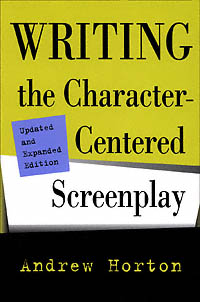 | Title: Writing the character-centered screenplay Author: Horton, Andrew Published: University of California Press, 1994 Subjects: Cinema and Performance Arts | Film | Writing Publisher's Description: "We need good screenwriters who understand character." Everywhere Andrew Horton traveled in researching this book - from Hollywood to Hungary - he heard the same refrain. Yet most of the standard how-to books on screenwriting follow the film industry's earlier lead in focusing almost exclusively on plot and formulaic structures.With this book, Horton, a film scholar and successful screenwriter, provides the definitive work on the character-based screenplay. Exceptionally wide-ranging - covering American, international, mainstream, and "off-Hollywood" films, as well as television - the book offers creative strategies and essential practical information.Horton begins by placing screenwriting in the context of the storytelling tradition, arguing through literary and cultural analysis that all great stories revolve around a strong central character. He then suggests specific techniques and concepts to help any writer - whether new or experienced - build more vivid characters and screenplays. Centering his discussion around four film examples - including Thelma & Louise and The Silence of the Lambs - and the television series, Northern Exposure , he takes the reader step-by-step through the screenwriting process, starting with the development of multi-dimensional characters and continuing through to rewrite. Finally, he includes a wealth of information about contests, fellowships, and film festivals.Espousing a new, character-based approach to screenwriting, this engaging, insightful work will prove an essential guide to all of those involved in the writing and development of film scripts. [brief] Similar Items |
| 5. | 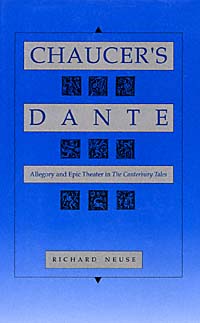 | Title: Chaucer's Dante: allegory and epic theater in The Canterbury tales Author: Neuse, Richard Published: University of California Press, 1991 Subjects: Literature | English Literature | European Literature | Medieval Studies Publisher's Description: Richard Neuse here explores the relationship between two great medieval epics, Dante's Divine Comedy and Chaucer's Canterbury Tales . He argues that Dante's attraction for Chaucer lay not so much in the spiritual dimension of the Divine Comedy as in the human.Borrowing Bertolt Brecht's phrase "epic theater," Neuse underscores the interest of both poets in presenting, as on a stage, flesh and blood characters in which readers would recognize the authors as well as themselves. As spiritual autobiography, both poems challenge the traditional medieval mode of allegory, with its tendency to separate body and soul, matter and spirit. Thus Neuse demonstrates that Chaucer and Dante embody a humanism not generally attributed to the fourteenth century. [brief] Similar Items |
| 6. | 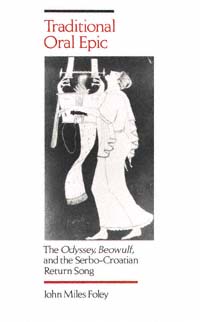 | Title: Traditional oral epic: the Odyssey, Beowulf, and the Serbo-Croatian return song Author: Foley, John Miles Published: University of California Press, 1991 Subjects: Literature | Literary Theory and Criticism | European Literature | Folklore and Mythology | Religion | Language and Linguistics | Classics | Medieval Studies Publisher's Description: John Miles Foley offers an innovative and straightforward approach to the structural analysis of oral and oral-derived traditional texts. Professor Foley argues that to give the vast and complex body of oral "literature" its due, we must first come to terms with the endemic heterogeneity of traditional oral epics, with their individual histories, genres, and documents, as well as both the synchronic and diachronic aspects of their poetics.Until now, the emphasis in studies of oral traditional works has been placed on addressing the correspondences among traditions - shared structures of "formula," "theme," and "story-pattern." Traditional Oral Epic explores the incongruencies among traditions and focuses on the qualities specific to certain oral and oral-derived works. It is certain to inspire further research in this field. [brief] Similar Items |
| 7. | 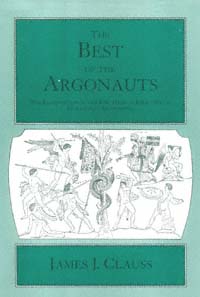 | Title: The best of the Argonauts: the redefinition of the epic hero in book one of Apollonius's Argonautica Author: Clauss, James Joseph Published: University of California Press, 1993 Subjects: Classics | Literature | Classical Literature and Language | Literary Theory and Criticism Publisher's Description: This revelatory exploration of Book One of the Argonautica rescues Jason from his status as the ineffectual hero of Apollonius' epic poem. James J. Clauss argues that by posing the question, "Who is the best of the Argonauts?" Apollonius redefines the epic hero and creates, in Jason, a man more realistic and less awesome than his Homeric predecessors, one who is vulnerable, dependent on the help of others, even morally questionable, yet ultimately successful.In bringing Apollonius' "curious and demanding poem" to life, Clauss illuminates two features of the poet's narrative style: his ubiquitous allusions to the poetry of others, especially Homer, and the carefully balanced structural organization of his episodes. The poet's subtextual interplay is explored, as is his propensity for underscoring the manipulation of the poetry of others through ring composition. [brief] Similar Items |
| 8. | 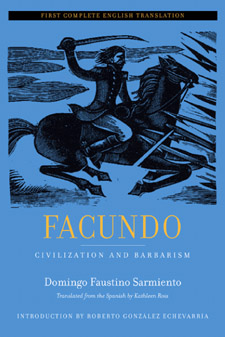 | Title: Facundo: civilization and barbarism: the first complete English translation Author: Sarmiento, Domingo Faustino 1811-1888 Published: University of California Press, 2004 Subjects: Literature | History | Latin American History | Politics | Literature in Translation Publisher's Description: A classic work of Latin American literature, Domingo Sarmiento's Facundo has become an integral part of the history, politics, and culture of Latin America since its first publication in 1845. Partially translated into English when it was first published, this foundational text appears here for the first time in its entirety. An educator and writer, Sarmiento was President of Argentina from 1868 to 1874. His Facundo is a study of the Argentine character, a prescription for the modernization of Latin America, and a protest against the tyranny of the government of Juan Manuel de Rosas (1835-1852). The book brings nineteenth-century Latin American history to life even as it raises questions still being debated today - questions regarding the "civilized" city versus the "barbaric" countryside, the treatment of indigenous and African populations, and the classically liberal plan of modernization. Facundo's celebrated and frequently anthologized portraits of the caudillo Juan Facundo Quiroga and other colorful characters give readers an exhilarating sense of Argentine culture in the making. Kathleen Ross's translation renders Sarmiento's passionate prose into English with all its richness intact, allowing the English-language reader the full experience of Facundo's intensity and historical reach. [brief] Similar Items |
| 9. |  | Title: Renard the Fox Author: Terry, Patricia Ann 1929- Published: University of California Press, 1992 Subjects: Literature | Poetry | Literature in Translation | Medieval Studies Publisher's Description: Renard the Fox is the first modern translation into English of one of the most important and influential medieval books. Valued for its comic spirit, its high literary quality, and its clever satire of feudal society, the tale uses animals to represent the members of various classes. This lively and . . . [more] Similar Items |
| 10. | 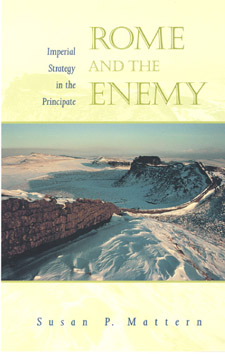 | Title: Rome and the enemy: imperial strategy in the principate Author: Mattern, Susan P 1966- Published: University of California Press, 1999 Subjects: Classics | Classical History | Classical Politics | Classical Literature and Language | Military History | Ancient History Publisher's Description: How did the Romans build and maintain one of the most powerful and stable empires in the history of the world? This illuminating book draws on the literature, especially the historiography, composed by the members of the elite who conducted Roman foreign affairs. From this evidence, Susan P. Mattern reevaluates the roots, motivations, and goals of Roman imperial foreign policy especially as that policy related to warfare. In a major reinterpretation of the sources, Rome and the Enemy shows that concepts of national honor, fierce competition for status, and revenge drove Roman foreign policy, and though different from the highly rationalizing strategies often attributed to the Romans, dictated patterns of response that remained consistent over centuries. Mattern reconstructs the world view of the Roman decision-makers, the emperors, and the elite from which they drew their advisers. She discusses Roman conceptions of geography, strategy, economics, and the influence of traditional Roman values on the conduct of military campaigns. She shows that these leaders were more strongly influenced by a traditional, stereotyped perception of the enemy and a drive to avenge insults to their national honor than by concepts of defensible borders. In fact, the desire to enforce an image of Roman power was a major policy goal behind many of their most brutal and aggressive campaigns. Rome and the Enemy provides a fascinating look into the Roman mind in addition to a compelling reexamination of Roman conceptions of warfare and national honor. The resulting picture creates a new understanding of Rome's long mastery of the Mediterranean world. [brief] Similar Items |
| 11. | 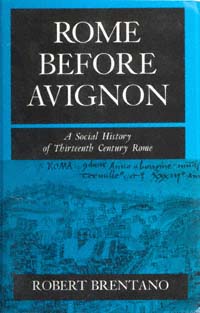 | Title: Rome before Avignon: a social history of thirteenth-century Rome Author: Brentano, Robert 1926- Published: University of California Press, 1991 Subjects: History | European History | Medieval History | Religion | Medieval Studies Publisher's Description: Robert Brentano evokes papal Rome in all its paradox and complicated brilliance. From a detailed re-creation of the physical "town" with its series of brick campanili and green and purple mosaic floors, to the intrigues of the great families, like the Orsini and Colonna, the reader is guided through complex and fascinating culture. Brentano's skill lies in his ability to combine the story of the vaulting ambition of the great families, only mildly tempered by their very real religious piety, with a vivid reconstruction of everyday life in postclassical Rome. [brief] Similar Items |
| 12. | 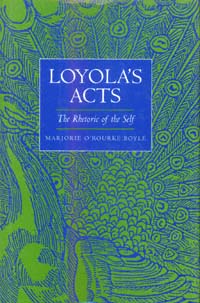 | Title: Loyola's acts: the rhetoric of the self Author: Boyle, Marjorie O'Rourke 1943- Published: University of California Press, 1997 Subjects: Literature | Renaissance History | Christianity | Rhetoric | Art History | Medieval History Publisher's Description: This revisionist view of Ignatius Loyola argues that his "autobiography" - until now taken to be a literal, documentary account - is in reality a work of rhetoric, a moral narrative that exploits the techniques of fiction. In radically reinterpreting this canonical text, our main source of information about the founder of the largest and most powerful religious order in Roman Catholicism, Boyle paints a vivid picture of Loyola's world. She surveys rhetorical and artistic theory, religious iconography, everyday custom, and an astonishing array of scenes and subjects: from curiosity, to codes of honor, to the holy places of Spain, to the significance of apparitions and flying serpents.Written in the tradition of Renaissance studies on individualism, Loyola's Acts engages current interest in autobiography and in the history of private life. The book also provides a powerful heuristic for interpreting a wide range of texts of the Christian tradition. Finally, this secular treatment of a canonized saint provides revealing insights into how a prestigious sixteenth-century figure like Loyola understood himself. [brief] Similar Items |
| 13. | 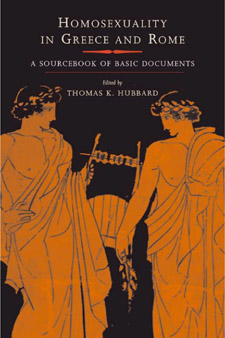 | Title: Homosexuality in Greece and Rome: a sourcebook of basic documents Author: Hubbard, Thomas K Published: University of California Press, 2003 Subjects: Gender Studies | Classics | GayLesbian and Bisexual Studies Publisher's Description: The most important primary texts on homosexuality in ancient Greece and Rome are translated into modern, explicit English and collected together for the first time in this comprehensive sourcebook. Covering an extensive period - from the earliest Greek texts in the late seventh century b.c.e. to Greco-Roman texts of the third and fourth centuries c.e. - the volume includes well-known writings by Plato, Sappho, Aeschines, Catullus, and Juvenal, as well as less well known but highly relevant and intriguing texts such as graffiti, comic fragments, magical papyri, medical treatises, and selected artistic evidence. These fluently translated texts, together with Thomas K. Hubbard's valuable introductions, clearly show that there was in fact no more consensus about homosexuality in ancient Greece and Rome than there is today. The material is organized by period and by genre, allowing readers to consider chronological developments in both Greece and Rome. Individual texts each are presented with a short introduction contextualizing them by date and, where necessary, discussing their place within a larger work. Chapter introductions discuss questions of genre and the ideological significance of the texts, while Hubbard's general introduction to the volume addresses issues such as sexual orientation in antiquity, moral judgments, class and ideology, and lesbianism. With its broad, unexpurgated, and thoroughly informed presentation, this unique anthology gives an essential perspective on homosexuality in classical antiquity. [brief] Similar Items |
| 14. | 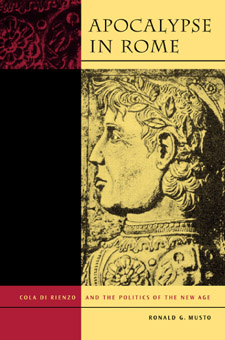 | Title: Apocalypse in Rome: Cola di Rienzo and the politics of the New Age Author: Musto, Ronald G Published: University of California Press, 2003 Subjects: History | European Studies | Medieval History | Medieval Studies | Autobiographies and Biographies | Classical Politics | Autobiographies and Biographies Publisher's Description: On May 20, 1347, Cola di Rienzo overthrew without violence the turbulent rule of Rome's barons and the absentee popes. A young visionary and the best political speaker of his time, Cola promised Rome a return to its former greatness. Ronald G. Musto's vivid biography of this charismatic leader - whose exploits have enlivened the work of poets, composers, and dramatists, as well as historians - peels away centuries of interpretation to reveal the realities of fourteenth-century Italy and to offer a comprehensive account of Cola's rise and fall. A man of modest origins, Cola gained a reputation as a talented professional with an unparalleled knowledge of Rome's classical remains. After earning the respect and friendship of Petrarch and the sponsorship of Pope Clement VI, Cola won the affections and loyalties of all classes of Romans. His buono stato established the reputation of Rome as the heralded New Jerusalem of the Apocalypse and quickly made the city a potent diplomatic and religious center that challenged the authority - and power - of both pope and emperor. At the height of Cola's rule, a conspiracy of pope and barons forced him to flee the city and live for years as a fugitive until he was betrayed and taken to Avignon to stand trial as a heretic. Musto relates the dramatic story of Cola's subsequent exoneration and return to central Italy as an agent of the new pope. But only weeks after he reestablished his government, he was slain by the Romans atop the Capitoline hill. In his exploration, Musto examines every known document pertaining to Cola's life, including papal, private, and diplomatic correspondence rarely used by earlier historians. With his intimate knowledge of historical Rome - its streets and ruins, its churches and palaces, from the busy Tiber riverfront to the lost splendor of the Capitoline - he brings a cinematic flair to this fascinating historical narrative. [brief] Similar Items |
| 15. |  | Title: Siting translation: history, post-structuralism, and the colonial context Author: Niranjana, Tejaswini 1958- Published: University of California Press, 1992 Subjects: Postcolonial Studies | Literary Theory and Criticism | Southeast Asia | Cultural Anthropology Publisher's Description: The act of translation, Tejaswini Niranjana maintains, is a political action. Niranjana draws on Benjamin, Derrida, and de Man to show that translation has long been a site for perpetuating the unequal power relations among peoples, races, and languages. The traditional view of translation underwritten by Western philosophy helped colonialism to construct the exotic "other" as unchanging and outside history, and thus easier both to appropriate and control.Scholars, administrators, and missionaries in colonial India translated the colonized people's literature in order to extend the bounds of empire. Examining translations of Indian texts from the eighteenth century to the present, Niranjana urges post-colonial peoples to reconceive translation as a site for resistance and transformation. [brief] Similar Items |
| 16. | 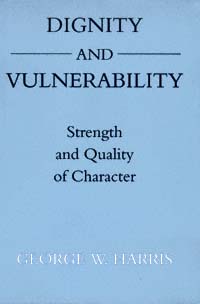 | Title: Dignity and vulnerability: strength and quality of character Author: Harris, George W Published: University of California Press, 1997 Subjects: Philosophy Publisher's Description: In this significant new addition to moral theory, George Harris challenges a view of the dignity and worth of persons that goes back through Kant and Christianity to the Stoics. He argues that we do not, in fact, believe this view, which traces any breakdowns of character to failures of strength. When it comes to what we actually value in ourselves and others, he says, we are far more Greek than Christian. At the most profound level, we value ourselves as natural organisms, as animals, rather than as godlike beings who transcend nature.The Kantian-Christian-Stoic tradition holds that if we were fully able to realize our dignity as Kantians, Christians, or Stoics, we would be better, stronger people, and therefore less vulnerable to character breakdown. Dignity and Vulnerability offers an opposing view, that sometimes character breaks down not because of some shortcoming in it but because of what is good about it, because of the very virtues and features of character that give us our dignity. If dignity can make us fragile and vulnerable to breakdown, then breakdown can be benign as well as harmful, and thus the conceptions of human dignity embedded in the tradition leading up to Kant are deeply mistaken. Harris proposes a foundation for our belief in human dignity in what we can actually know about ourselves, rather than in metaphysical or theological fantasy. Having gained this knowledge, we can understand the source of real strength. [brief] Similar Items |
| 17. | 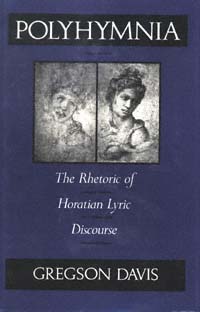 | Title: Polyhymnia: the rhetoric of Horatian lyric discourse Author: Davis, Gregson Published: University of California Press, 1991 Subjects: Classics | Classical Literature and Language | Rhetoric Publisher's Description: Horace's Odes have a surface translucency that belies their rhetorical sophistication. Gregson Davis brings together recent trends in the study of Augustan poetry and critical theory and deftly applies them to individual poems. Exploring four rhetorical strategies - what he calls modes of assimilation, authentication, consolation, and praise and dispraise - Davis produces enlightening, new interpretations of this classic work. Polyhymnia , named after one of the Muses invoked in Horace's opening poem, revises the common image of Horace as a complacent, uncomplicated, and basically superficial singer. Focusing on the artistic persona - the lyric "self" that is constituted in the text - Davis explores how the lyric speaker constructs subtle "arguments" whose building-blocks are topoi, recurrent motifs, and generic conventions. By examining the substructure of lyric argument in groupings of poems sharing similar strategies, the author discloses the major principles that inform Horatian lyric composition. [brief] Similar Items |
| 18. | 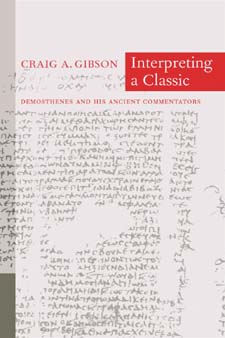 | Title: Interpreting a classic: Demosthenes and his ancient commentators Author: Gibson, Craig A 1968- Published: University of California Press, 2002 Subjects: Classics | Classical Literature and Language | Rhetoric | Classical History Publisher's Description: Demosthenes (384-322 b.c.) was an Athenian statesman and a widely read author whose life, times, and rhetorical abilities captivated the minds of generations. Sifting through the rubble of a mostly lost tradition of ancient scholarship, Craig A. Gibson tells the story of how one group of ancient scholars helped their readers understand this man's writings. This book collects for the first time, translates, and offers explanatory notes on all the substantial fragments of ancient philological and historical commentaries on Demosthenes. Using these texts to illuminate an important aspect of Graeco-Roman antiquity that has hitherto been difficult to glimpse, Gibson gives a detailed portrait of a scholarly industry that touched generations of ancient readers from the first century b.c. to the fifth century and beyond. In this lucidly organized work, Gibson surveys the physical form of the commentaries, traces the history of how they were passed down, and explains their sources, interests, and readership. He also includes a complete collection of Greek texts, English translations, and detailed notes on the commentaries. [brief] Similar Items |
| 19. | 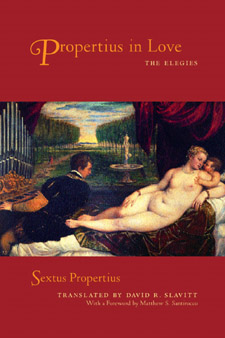 | Title: Propertius in love: the elegies Author: Propertius, Sextus Published: University of California Press, 2002 Subjects: Classics | Classical Literature and Language | Literature in Translation | Poetry | Literature in Translation Publisher's Description: These ardent, even obsessed, poems about erotic passion are among the brightest jewels in the crown of Latin literature. Written by Propertius, Rome's greatest poet of love, who was born around 50 b.c., a contemporary of Ovid, these elegies tell of Propertius' tormented relationship with a woman he calls "Cynthia." Their connection was sometimes blissful, more often agonizing, but as the poet came to recognize, it went beyond pride or shame to become the defining event of his life. Whether or not it was Propertius' explicit intention, these elegies extend our ideas of desire, and of the human condition itself. [brief] Similar Items |
| 20. | 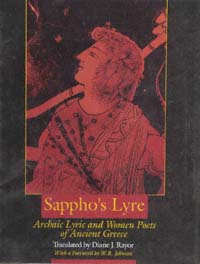 | Title: Sappho's lyre: archaic lyric and women poets of ancient Greece Author: Rayor, Diane J Published: University of California Press, 1991 Subjects: Classics | Classical Literature and Language | Literature in Translation | Poetry Publisher's Description: Sappho sang her poetry to the accompaniment of the lyre on the Greek island of Lesbos over 2500 years ago. Throughout the Greek world, her contemporaries composed lyric poetry full of passion, and in the centuries that followed the golden age of archaic lyric, new forms of poetry emerged. In this unique anthology, today's reader can enjoy the works of seventeen poets, including a selection of archaic lyric and the complete surviving works of the ancient Greek women poets - the latter appearing together in one volume for the first time. Sappho's Lyre is a combination of diligent research and poetic artistry. The translations are based on the most recent discoveries of papyri (including "new" Archilochos and Stesichoros) and the latest editions and scholarship. The introduction and notes provide historical and literary contexts that make this ancient poetry more accessible to modern readers.Although this book is primarily aimed at the reader who does not know Greek, it would be a splendid supplement to a Greek language course. It will also have wide appeal for readers of' ancient literature, women's studies, mythology, and lovers of poetry. [brief] Similar Items |